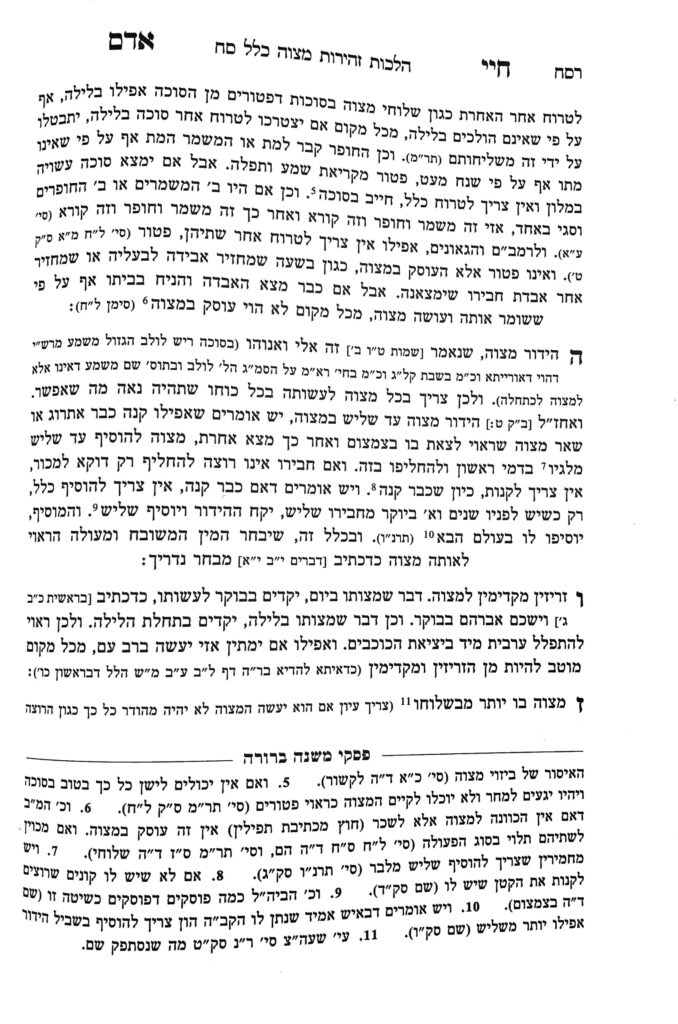We are continuing in siman 6, discussing the concept of zrizin makdimin. Today we will clarify the different leshonos found in Chazal regarding doing mitzvos with alacrity.
There are a few concepts found in Chazal regarding doing mitzvos with alacrity, and they seem to overlap.
The first is zirizin makdimin.
Next is the concept of ain ma’avirin, which would appear to be similar to zrizin makdimin. We clarified that ain ma’avirin does not just apply to physical mitzvos, but to time as well.
We also mentioned the concept of shihuyei mitzvah lo mashhinan, not to push off a mitzvah. The Gemara mentions this concept regarding yibum. The mitzvah is for the oldest brother to perform yibum, but if he is unavailable, we do not wait for him to come, but rather let a younger brother perform the mitzvah due to this concept.
There is a concept of mitzvah haba’ah leyadecha al tachmitzena, not to let a mitzvah “rise” (i.e., not to ignore it). The Chayei Adam understood it to be the source for the concept of ain ma’avirin, but Chazal understood it to be its own concept as well.
We will clarify the differences between these concepts.
The difference between zrizin makdimin and ain ma’avirin is that ain ma’avirin applies once a mitzvah has already presented itself, either in physical presentation (e.g., tefillin in front of me) or in time, (e.g., whether Purim should be in Adar I or Adar II). We discussed the parameters of this concept previously (see siman 1).
On the other hand, zrizin makdimin applies even before a mitzvah presents itself. For example, a bris milah cannot be performed until sunrise, but zrizin makdimin enjoins a person to get up before sunrise to prepare themselves to be ready for the bris once sunrise has passed. So zrizin makdimin is mechayev a person before the mitzvah while ain ma’avirin is only mechayev a person once the mitzvah presents itself.
Mitzvah haba’ah leyadecha al tachmitzena refers to a mitzvah which has already presented itself (hence haba’ah leyadecha, it has already come into one’s hand). Once it has presented itself, a person should not make it wait. The Chayei Adam understood this concept to be the source of ain ma’avirin. The difference between these two concepts is that ain ma’avirin refers to passing or ignoring the mitzvah currently in one’s hand completely. Mitzvah haba’ah leyadecha refers to waiting or delaying before performing a mitzvah currently in one’s hand, even if they do not plan to pass over it completely.
Shihuyei mitzvah lo mashhinan is understood to be referring to the concern that if one does not perform a mitzvah immediately, they may lose the opportunity. (Even if one is guaranteed that they will not lose the opportunity, this concept additionally includes the hiddur that something which one is excited about should not be pushed off.)
For example, regarding yibum, if the older brother is not present, the concept of al tachmitzena does not apply, because the primary mitzvah applies to the older brother. If the older brother is not present, the mitzvah is not considered as having presented itself. However, Chazal were concerned that the mitzvah would not end up being performed, and did not want the mitzvah to wait. This concern is more from the perspective of the mitzvah rather than from that of those performing it.
There are other approaches as well to understanding the difference between these concepts, but this is the approach we will work with.
Summary
Zirizin makdimin refers to the preparations put into performing a mitzvah–even before the mitzvah presents itself–to avoid any issues of ain ma’avirin or shihuyei mitzvah
Ain ma’avirin refers to passing over or ignoring a mitzvah completely.
Mitzvah haba’ah leyadecha al tachmitzena refers to delaying in performing a mitzvah, even if one will not ignore it completely.
Shihuyei mitzvah lo mashhinan refers to the concern that one may lose the opportunity to fulfill a mitzvah if they do not fulfill it immediately. This is true even if the actual chiyuv has not started. It also includes the hiddur to not make a mitzvah wait



